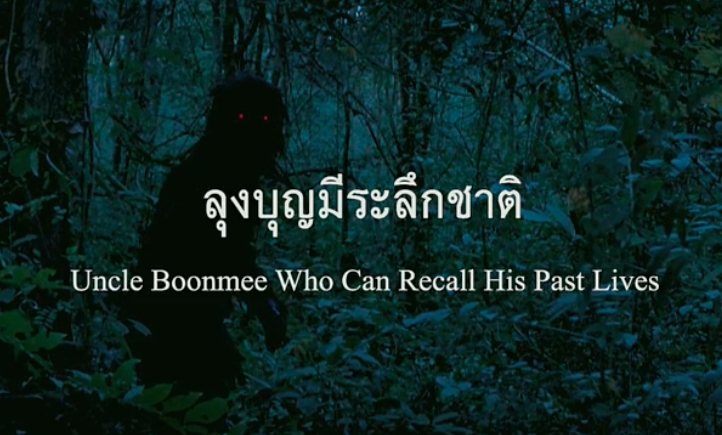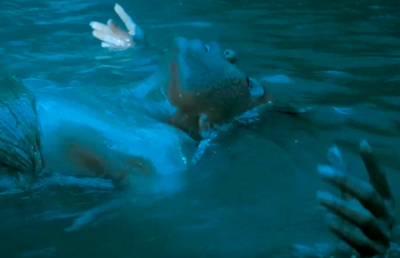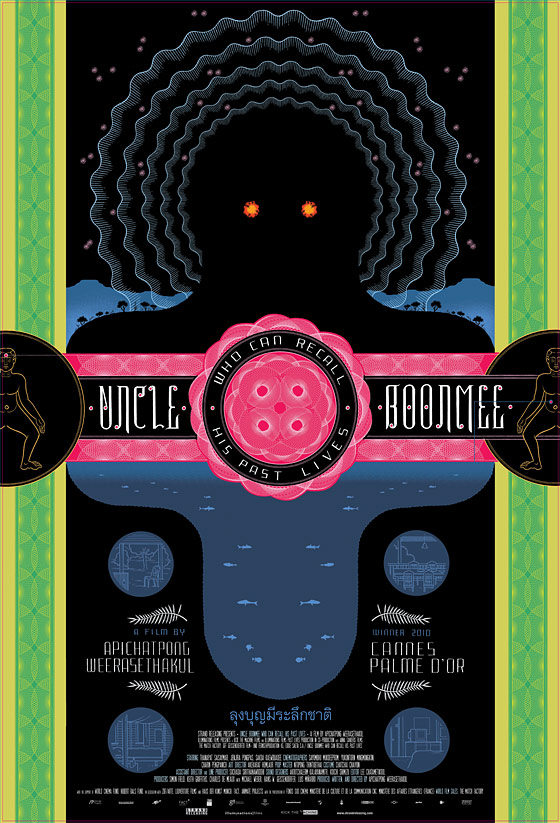Review: Uncle Boonmee Who Can Recall His Past Lives
 Friday, March 4, 2011 at 6:38PM
Friday, March 4, 2011 at 6:38PM Editor's Note: This review was originally published last year. Uncle Boonmee is now in theaters, ready to capitalize on its big win at Cannes... uh...10 months ago; way to strike while the iron is hot, distributors! If you're just getting a chance to see it for the first time, The Film Experience would love to hear any reactions.

Uncle Boonmee can recall his past lives. My memory is hardly as uncanny. Recalling or describing Uncle Boonmee Who Can Recall His Past Lives, the Cannes Palme D'Or winner and Thailand's 2010 Oscar submission, even a few days after the screening is mysteriously challenging. Even your notes won't help you.
This is not to say that the movie isn't memorable, rather that its most memorable images and stories refuse direct interpretation or cloud the edges of your vision, making it as hazy as the lovely cinematography. You can recall the skeletal story these images drift towards like moths and you can try to get to know the opaque characters that see them with you but these efforts have a low return on investment. What's important is the seeing.
What's wrong with my eyes? They are open but I can't see a thing.
 Most synopses of the movie will only embellish on the film's title. And while Uncle Boonmee does reflect on past lives, he only does so directly in the pre-title sequence as we follow him in ox form through an attempted escape from his farmer master, who will eventually rope him back in. The bulk of the film is not a recollection -- at least not from Boonmee himself, but a slow march towards his death while he meditates on life and the film meditates on animal and human relations. His nephew and sister in law, who objects to his immigrant nurse, visit him. So too does his dead wife and another ghostly visitor on the same night, in a bravura early sequence that as incongruously relaxed as it is eery and startling.
Most synopses of the movie will only embellish on the film's title. And while Uncle Boonmee does reflect on past lives, he only does so directly in the pre-title sequence as we follow him in ox form through an attempted escape from his farmer master, who will eventually rope him back in. The bulk of the film is not a recollection -- at least not from Boonmee himself, but a slow march towards his death while he meditates on life and the film meditates on animal and human relations. His nephew and sister in law, who objects to his immigrant nurse, visit him. So too does his dead wife and another ghostly visitor on the same night, in a bravura early sequence that as incongruously relaxed as it is eery and startling.
The film peaks well before its wrap with the story of a scarred princess and a lustful talking catfish and then we begin the march towards Boonmee's death, perhaps the most literal moment in the movie. And then curiously, the movie continues on once he's gone. If it loses much of its potency after Boonmee has departed, there are still a few fascinating images to scratch your head over when he's gone.
The bifurcated structure that Weerathesakul has employed in the past is less prevalent this time. Uncle Boonmee plays out not so much like two mysteriously reflective halves (see the haunting Tropical Malady which I find less accessible but actually stronger), but rather like a series of short films that all belong to the same continuous chronological movie, give or take that gifted horny catfish. Surely a google search, press notes, academic analysis or listening to the celebrated director Apichatpong "Joe" Weerathesakul speak (as I did after the screening) would and can provide direct meaning to indirect cinema. But what's important is the seeing.
Surely a google search, press notes, academic analysis or listening to the celebrated director Apichatpong "Joe" Weerathesakul speak (as I did after the screening) would and can provide direct meaning to indirect cinema. But what's important is the seeing.
Vision is frequently mentioned and referenced in Uncle Boonmee, whether it's mechanical as in a preoccupation with photography or organic. But like the ghost monkey with glowing red eyes (the film's signature image) says to Uncle Boonmee early in the film, "I can't see well in the bright light." It's the one exchange in the film that I wholly related to and understood. I'm not sure I need or even want to understand, to attach specific meaning to these confounding stories and images. That's too limiting. I only want to see them. Weerasethakul's movie is best experienced in the dark, with the images as spiritual guides. They fall around you like mosquito netting as you walk slowly through the Thai jungle. B+



Reader Comments (6)
I want to know what is your interpretation of the ending scene where the monk doubles?
This film is odd and weird, but it’s thought provoking.
I like the last section of this review, because it very much captures how I felt as the movie started, during the scene with the ox. The way he shoots the jungle makes it seem like another, totally cinematic world, where life moves at different speeds. The dinner sequence where the spirits start showing up and the episode with the catfish are definitely the most indelible, but he even manages to fit a lot of sensations and impressions into scenes with nothing but waiting. (In Boonmee's bedroom, outside in the sun, in the hotel at the end...)
Anyway, very beautiful movie that I'd watch again in an instant. It rarely made much sense, but the experience was still pretty overwhelming.
Even though I saw this last year (at Cannes), it's my #1 film for 2011. Had it been released last year it would have given Blue Valentine a run for its money as numero uno para 2010.
I didn't get this film much. I prefer Tropical Malady and my favorite was actually Syndromes and the Century. However, as a Thai person, Joe is one of few things that I'm proud of. And I really admire him as a person, met him a few times in some local events. Hope it will do well in USA. I may have to see it again some time too.
This was one of my favorite movies from last year. I have my review of it from last year here (not to shamelessly promote but I feel like its too long for a comment:
http://abwafb.blogspot.com/2010/09/nyff-diaries-uncle-boonmee-who-can.html
If this ever comes nearby (and it just might) I'm totally seeing it in a theatre. Anywhere else would seem displaced, I feel. Not at home, not online, etc. It's just seems like one of THOSE movies.